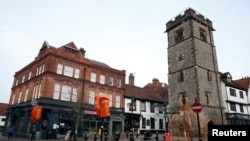Britain entered another strict national lockdown Tuesday, amid a sudden and sharp resurgence in cases of COVID-19 linked to a new variant of the coronavirus.
Prime Minister Boris Johnson announced the measures in a somber televised address Monday evening. “As I speak to you tonight, our hospitals are under more pressure from COVID than at any time since the start of the pandemic,” Johnson said.
“In England alone, the number of COVID patients in hospitals has increased by nearly a third in the last week to almost 27,000. And that number is 40 per cent higher than the first peak in April. On the 29th of December, more than 80-thousand people tested positive for COVID across the U.K., a new record. The number of deaths is up by 20 percent over the last week and will sadly rise further,” Johnson added. “We must therefore go into a national lockdown which is tough enough to contain this variant. That means the government is once again instructing you to stay at home.”
The prime minister himself has cancelled a planned trip to India.
Britain’s elementary schools had only re-opened for the new term Monday morning. The policy reversal took many teachers by surprise. “It is something which will have a deep impact on children, a deep impact on their well-being and mental health,” the Children's Commissioner for England Anne Longfield told Sky News.
Scientists warn the new variant of the coronavirus identified in southern Britain in September is up to 70 percent more infectious and is now spreading across the country. In London, an epicenter of the new variant outbreak, doctors say they are struggling to cope as ambulances line up outside emergency rooms carrying sick patients, with intensive care units at full capacity.
“We have people in their forties, their thirties, their twenties on our intensive care unit, dying of COVID,” said Dr. Dominic Spray, the clinical director of adult critical care at St George’s Hospital in south London. “We are having to think about whether we do cancer surgery. We are having to postpone cancer surgeries because of the number of COVID patients we have in.”
Senior nurse Chloe Peach said staff morale is suffering. “It's been one of the worst shifts of my entire life. Intense,” Peach said Monday evening. “I'm looking after many more sick patients than I normally look after. It's just overwhelming, the whole situation.”
Once again, the British government must respond to an escalating health emergency and a resurgent economic crisis, as non-essential shops and services are forced to close. The government announced one-time grants of up to $12,200 for businesses. However, many retailers, pubs and restaurants have already closed their doors for good.
Gary Marshall, the owner of London-based Bevington Salads, which supplies the hospitality industry, said trade was running at a fifth of pre-pandemic levels. “The lockdowns, the tier systems, especially to the hospitality sector, have had a tremendous effect, an astronomical effect on the industry. It is really, really in a bad place,” he said.
However, this time there is one big difference. Britain began mass vaccinations using the drug developed by Oxford University and AstraZeneca Monday, following its approval by regulators in late December. Already a million people have received the Pfizer-BioNTech vaccine. The government aims to inoculate 2 million people per week from Monday.
In his televised address Monday, Prime Minister Johnson said there was light at the end of the tunnel. “By the middle of February, if things go well and with a fair wind in our sails, we expect to have offered the first vaccine dose to everyone in the four top priority groups,” he said.
“That means vaccinating all residents in a care home for older adults and their carers, everyone over the age of 70, all frontline health and social care workers, and everyone who is clinically extremely vulnerable. If we succeed in vaccinating all those groups, we will have removed huge numbers of people from the path of the virus. And of course, that will eventually enable us to lift many of the restrictions we have endured for so long," he said.
Johnson said the easing of lockdown measures could happen by March if the vaccinations go as planned. But he warned the coming weeks will be the hardest yet for Britain since the pandemic began.






